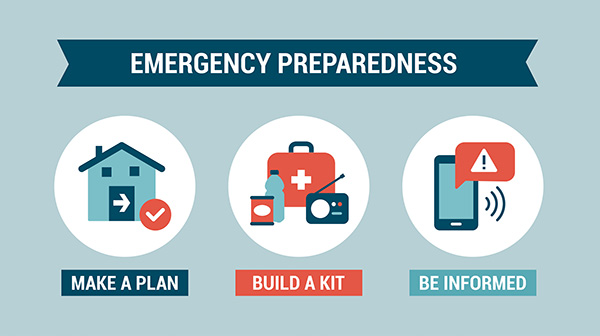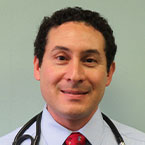By: Claire McCarthy, MD, FAAP & Scott Needle, MD, FAAP
Nobody likes to think about disasters affecting our communities. But whether its
hurricanes,
wildfires,
tornados, or other disasters, thinking about it is exactly what we need to do. Preparation makes all the difference; it can literally save lives.
Children and families can prepare together. Disasters can be scary, but being ready is one way to be less afraid!

Empty heading
10 ways to prepare your family for disasters
Here are some simple and important things you can do with your family:
Talk to your children about disasters that might happen—and what they should do.
Know where to get reliable news and information about weather and disasters. Arrange a few different ways to receive alerts, such as texts.
Teach children the basics about
what to do in a fire, such as getting low to avoid smoke or feeling doorknobs for heat before opening them. Have a fire escape plan.
If you live in an area affected by hurricanes , tornadoes, wildfires or
earthquakes, talk with children about how to recognize the signs and where they should go.
Make sure children know how to
call 911 and can give their name and address. Even very young children can learn this.
Decide on a person (preferably not a local person who might be affected by the same disaster) that everyone can contact if you are separated.
Have a meeting place outside the house where family members can go if you are separated and can't reach each other.
Practice! That is the best way to be sure the information sticks. Have fire drills and drills for other possible disasters where you live. If you have young children, try making it a game—they will be less scared and more willing to practice regularly.
Plan for where you would go if you had to evacuate. If you have pets, make sure the place you are going will accept them.
If you plan to purchase a generator for extended power outages after disasters, be sure to learn about steps to prevent
carbon monoxide poisoning
Empty heading
Empty heading
Put together a family disaster kit
Having
basic supplies is key if there is a disaster. In the heat of the moment, though, you may not have the time, or presence of mind, to gather them. So, do it ahead of time.
The American Academy of Pediatrics and
the Centers for Disease Control and Prevention have great information on items to pack, but here are some ideas to get you started:
A
first-aid kit
Water (2 gallons per day per person)
Flashlights, batteries, chargers
A battery-operated radio
Non-perishable foods, such as canned foods (include a can opener), granola bars and peanut butter
Cups and utensils (you can pick up some inexpensive camping kits)
Spare clothes, and a blanket or two
Toys or games
Supplies for pets
Medications—if you can, try to stay ahead of your refills and keep one in the
disaster kit. At the very least, take a picture of the bottle so that you know exactly what you take.
Tip: It's not always possible to keep things like current
medications stored away, so make a checklist of everything you might need to grab quickly. You can tape the list to the top of the container, which should be a manageable size (you may need a couple of them) and in a readily accessible place in your house.
Involve your children in planning and packing—you can make it a game by doing a scavenger hunt. Remember to check expiration dates and have kids help with remembering and doing that, too. The more you make it something regular and ordinary, the better.
Hopefully, your emergency preparations will never be more than a game. But should a disaster ever hit, they will be the most important game your family ever played.
More information
About Dr. McCarthy:
 Claire McCarthy, MD, FAAP is a primary care pediatrician at Boston Children's Hospital, an Assistant Professor of Pediatrics at Harvard Medical School, a senior editor for Harvard Health Publications, and an official spokesperson for the American Academy of Pediatrics. She writes about health and parenting for the Harvard Health Blog, Huffington Post and many other online and print publications. Claire McCarthy, MD, FAAP is a primary care pediatrician at Boston Children's Hospital, an Assistant Professor of Pediatrics at Harvard Medical School, a senior editor for Harvard Health Publications, and an official spokesperson for the American Academy of Pediatrics. She writes about health and parenting for the Harvard Health Blog, Huffington Post and many other online and print publications.
|
About Dr. Needle
 Scott Needle, MD, FAAP, is a primary care pediatrician who is the chief medical officer for Elica Health Centers in Sacramento, California. He served as the former chairperson for the federal National Advisory Committee for Children and Disasters, and is currently a member of the executive committee of the AAP Council on Children and Disasters. Dr Needle has produced numerous AAP handouts and educational presentations and is the lead author for the AAP policy,
Ensuring the Health of Children in Disasters. Scott Needle, MD, FAAP, is a primary care pediatrician who is the chief medical officer for Elica Health Centers in Sacramento, California. He served as the former chairperson for the federal National Advisory Committee for Children and Disasters, and is currently a member of the executive committee of the AAP Council on Children and Disasters. Dr Needle has produced numerous AAP handouts and educational presentations and is the lead author for the AAP policy,
Ensuring the Health of Children in Disasters.
|